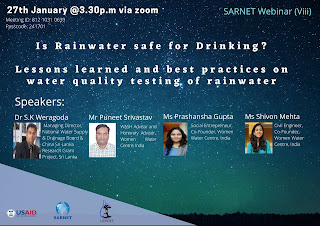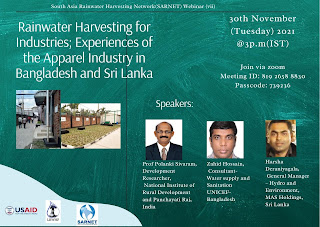Posts
How Israel created a water crisis for Palestinians | It's Complicated
- Get link
- X
- Other Apps
An epilogue to the international day of education Baarish Sanvaad- Ep 03
- Get link
- X
- Other Apps

“Is rainwater safe for drinking? Lessons learned and best practices on water quality testing of rainwater”
- Get link
- X
- Other Apps

The SARNET webinar 8 on the theme “Is rainwater safe for drinking? Lessons learned and best practices on water quality testing of rainwater” concluded on the 27 th of January 2022 joined by speakers from Sri Lanka and India. Development practitioners, activists, researchers, and enthusiasts from the South Asia region representing the WASH sector from South Asia region attended the webinar. This webinar was moderated by Mr. Zaheer Gardezi a Civil Engineer and a development professional from Pakistan. Dr. S.K Weragoda, Managing Director of the National Water Supply Services and Drainage Board, Sri Lanka, and the team led by Mr. Puneet Srivastav from WASH Solutions and Ms. Prashansha Gupta and Ms. Shivon Mehta from Women Water Centre, Lucknow, India presented the general perceptions, the daily drinking water demand, concerns stemming from lack of awareness and accessibility to water quality testing of harvested rainwater and innovative approaches to address the situation. Open...
Water Management experts from South Asia Region highlight the need for exploring alternative sources due to the increased demand for water with the Covid 19 pandemic
- Get link
- X
- Other Apps

The 3 rd in the series the webinar organized by South Asia Rainwater Harvesting Network(SARNET) : “Covid 19, Rainwater Harvesting; Issues, challenges, and best practices” concluded on the 29 th of January 2021 with the active participation of 20 water management experts, activists and government representatives from South Asia. Rajindra Ariyabandu Chairman of the Lanka Rainwater Harvesting Forum opening the discussion highlighted the benefits of rainwater harvesting facility during the Covid-19 lockdown for communities in Sri Lanka. A Lanka Rainwater Harvesting Forum survey of rainwater harvesting households during the first wave of Covid 19 revealed that 92% of the households surveyed in 3 dry zone districts of Sri Lanka benefitted during the lockdown as they had adequate water at their home for drinking, hand washing, and cleaning purposes. The findings also revealed that 19% shared the water available in the rainwater harvesting tanks with others. Dhanushi Se...
Experiences of the Apparel industry in Bangladesh and Sri Lanka demonstrate that rainwater harvesting can contribute to reducing the water footprint and businesses to grow
- Get link
- X
- Other Apps

Across South Asia and in many other parts of the world industries are lavish consumers of water. Some examples of high water-consuming industries are Textiles & Apparel, Power generation, and beverage. The apparel industry is one of the key water-dominant industries and has a lot of insights to offer in terms of water consumption and conservation. The 07 th webinar of the SARNET bi-monthly webinar series concluded on the 30 th of November last week and featured some best practices from the apparel industry in Bangladesh and Sri Lanka. The webinar on the topic of " Rainwater Harvesting for Industries; Experiences of the Apparel Industry in Bangladesh and Sri Lanka" was attended by many development practitioners, academics, and other enthusiasts from South Asia and other parts of the world. Mr. Zahid Hossain, a consultant to the UNICEF having long years of experience in the development sector from Bangladesh and Mr. Harsha Deraniyagala, General Manager, MAS Holding...
Residents in Pune, in Maharashtra India, are proponents of water conservation and rainwater harvesting
- Get link
- X
- Other Apps

Pune in Maharashtra India is blessed with an annual average rainfall of 900mm. While there was substantial rainfall the runoff waters ended up in drains without much use. It is one of the largest urban cities in Maharashtra. Though dams were constructed water availability was not consistent to meet the demand of the the entire area. In order to meet the growing demand due to rapid urbanization in the region the popularly adopted method adopted among residential groups in the city were to dig bore wells. The bore wells were extracting water 450 to 600ft below ground. The Groundwater Survey Department of Maharashtra was already sending warning signals about the likely depletion of groundwater resources. Shashwat Eco Solution Foundation works in the environmental sector of sanitation, solid waste management, and water harvesting in Pune Maharashtra. With the aim of making the community sensitive to adopting Water conservation measures, this NGO conducts a survey to ident...